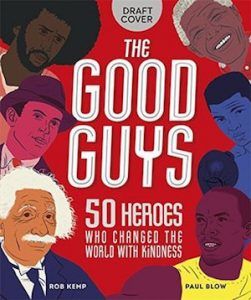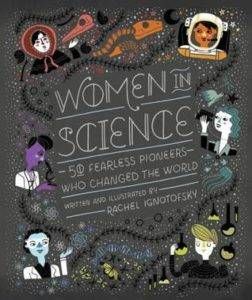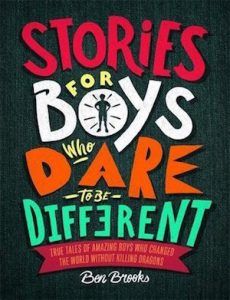
Good Guys and Stories for Boys Who Dare to Be Different

My sweet young son has grown up in a lovely little bubble of peace breaths and filling up figurative buckets with good emotions. His preschool teachers referred to every child as “friend” and it was the kind of place where multiple teachers were members of the LGBT community, and would talk about their husbands or wives with the children. We read picture books about transgender people, and afterward, he had a big think about it, then told me (and our neighbor) that he is cis-gender. He has spent most of his life with a strong-willed big sister, and me, a staunchly feminist mother.
The Women of Science
We were reading Rachel Ignotofsky’s beautiful book Women of Science. Together, we paged through each geometric page, read the bios, paused to read the entry about Mae Jemison (my son’s favorite scientist). After I’d finished, my son looked up and said in tiny, absolute seriousness, “Where are the men of science?”
It was slightly hilarious, considering the history of women in science. I may have laughed a little before explaining that women used to be prevented from participating in science. This book was trying to change that idea.
It also gave me a small window into his experience as a 21st Century preschooler. I realized that we spent a lot of time talking about amazing women, and that my son, who has a strong self-identity as a boy, isn’t being shown examples of the kind of man I’d like him to grow into.
He absolutely should spend time looking through books about the accomplishments of women; he should find Mae Jemison and Katherine Johnson heroic, because all little boys should see amazing black women as heroes; he should read broad fiction that allows him to empathize with or imagine himself in the lives of a huge range of characters, including those who are unlike him. But I also need to help him find the kind of masculinity that connects with the kind of preschool experience he has had, one where trans people are simply our friends, where loving teachers are both men and women, where he’s allowed to cry, practice cooking and cleaning, and spend time looking after a baby doll.
Modern feminism isn’t just about shifting the needle for marginalized people, we want to shift the sphere where men exist. Opening all the doors for all kinds of women and non-binary folks is vitally important, but if we don’t have an aim for a better kind of masculinity, we’ll just have the same cyclical conversations.
Two Different Expectations
In my early-20s I had the same conversation with friends from different friend groups, with different political stances, in different parts of the country, and even in different countries. So many of my brilliant women friends were choosing to be single because they couldn’t find men who wanted to treat them as equals. Men who want a girlfriend to be their mother were plentiful among our acquaintance; my friends were mostly not looking to mother their boyfriends. “I don’t have time for a boyfriend!” one friend said, “They take so much energy. I’m busy!”
It struck me that feminism had raised women of my age to expect that our partners would be our equals, but that men my age largely hadn’t been raised with that same expectation. Feminism had been so busy talking to women, that it hadn’t brought men forward with the conversation.
 Conclusion
Conclusion
These books on the surface might just be more celebrations of men in a world that is saturated with them. But on a granular level, it’s a Trojan Horse, sneaking in to tear down the walls of the Patriarchy from the inside. Let’s see masculinity that cries, nurtures, and hugs. A man who expresses his feelings thoughtfully and cares for others is still a man.
So, why do we need these books, why do we need more books about the accomplishments of men? Not because boys need their own books, because shouldn’t read about women. We need these books because we need to change our ideas of what it means to be a man and to give our sons a different kind of masculinity to grow into. Hopefully one where they grow from preschoolers filling buckets into empathetic men caring for the world.




 Conclusion
Conclusion







